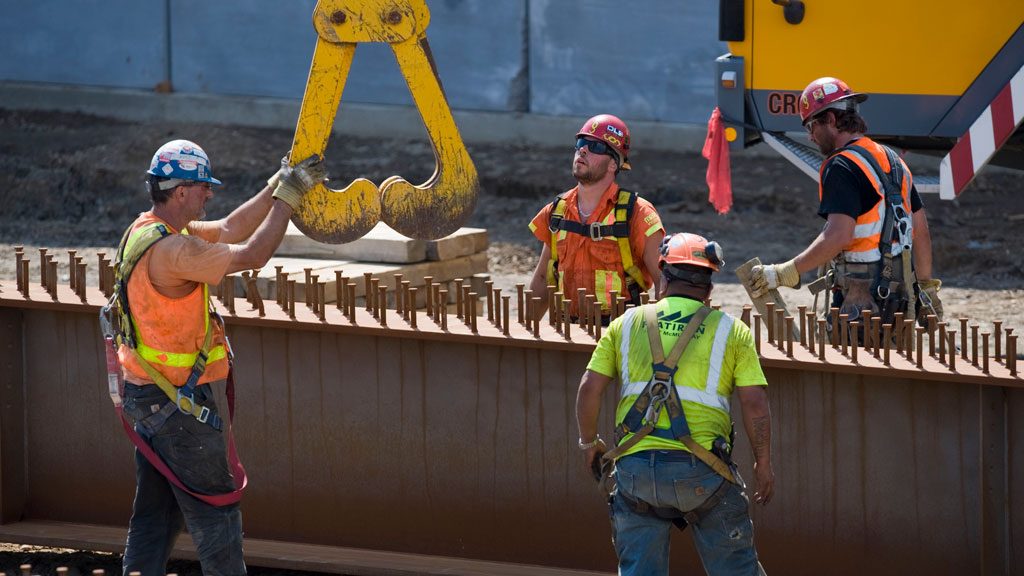The Alberta Construction Association (ACA) is asking the government to amend a section of the provincial labour code that governs overtime provisions and hours-of-work averaging agreements on projects.
Ken Gibson, executive director of the ACA, says present rules allow employers and employees to agree to average work hours over a period of one to 12 weeks to determine overtime eligibility.
The association wants the period extended so hours of work can be averaged over an entire construction season.
Under the labour code, employees are limited to working up to 44 hours a week averaged over a 12-week agreement period before overtime provisions kick in.
Gibson said the association is hoping the government will amend Section 23.1 of its Employment Standards Code to allow hours of work to be averaged, for example, from March 1 to Oct. 31 or April 1 to Nov. 30.
He maintains both employers and employees are concerned that the present averaging period is not sufficiently flexible to accommodate the site-specific, project-based, seasonal nature of construction work.
“Our employers report that their employees are requesting the flexibility to safely work longer days over an entire season. Workers have gone to their employers and said, ‘Hey, what gives?’ ” he said, “and employers are saying, ‘Sorry, this isn’t something we instituted. This is a change in the law and we’ve got to comply with the law.’ ”
The benefit to employers, said Gibson, is that it allows them to schedule employees to work longer hours a day at the regular wage rate so they avoid having to bring in more workers for a project. For employees it allows them to maximize their hours per day in the warmer months when the weather is more favourable or when they are at a remote location and away from their residence and family.
However, Terry Parker, executive director of the Building Trades of Alberta, said he hasn’t heard a lot of complaints from unionized trade workers on the averaging issue despite what the employers are saying.
Employers are likely concerned because they want workers to be able to work longer periods at the standard rate as opposed to booking overtime, he said.
“They want to obviously keep the labour costs low and there’s a cost to bringing people in as well,” he said. “If you’re bringing people in and having to pay them more or having them sit there there’s a cost associated to that.”
Parker said while employers want workers to work longer hours at straight pay, the Building Trades merely want them to be paid appropriately.
“I think where we differ from the construction association is that they would prefer that the individuals get paid at a standard rate and we obviously want overtime provisions to be kicked in if they have to be working in excess of those hours,” he stated.
The government’s approach may not fully reflect the realities of our project-based work environment
— Ken Gibson
Alberta Construction Association
Parker said he has no objection to trades working longer hours as long as they’re getting paid according to the collective agreements.
“That is our main concern,” he said. “We work on these collective agreements and work under them for the benefit of our members as well so as long as there’s no violations in regards to that we’re good.”
Gibson said because of the rules employees working on a job end up earning less money because employers end up bringing in more workers to avoid overtime.
“We’ve actually had a number of employers tell us their employees are really angry because, say somebody used to earn $100,000 a year and that entailed a number of hours of overtime, the employer is now reluctant to give overtime,” he said. “When there is a peak on a job they will bring on additional workers.”
Gibson said workers employed on a remote project aren’t interested in putting in an eight-hour day and going to stay in a hotel.
“They want to get the work done in four days rather than five and get home to spend that fifth day with their family.”
The ACA and a number of partner associations met with Labour Minister Christina Gray to discuss the matter, but so far the government has not budged from its position.
“We were hoping to get a change for this construction season,” Gibson said, “but, of course, time is marching on.”
He said employers will comply with the law, but are concerned their employees are unhappy with the change, as hiring more workers during peak times followed by layoffs when the peak ends means less career stability.
“I think the government’s approach may not fully reflect the realities of our project-based work environment so we’re just asking the government to have a second look at this really to benefit the employee,” he added.
“The employers will comply with the law. They’ll make it work for their operation, but in the end it is actually hurting the people it was intended to help.”











With these new rules we can’t get our guys to work out of town.
Also all our employees who used to bank hours to compensate for sicks days for themselves or their family we no longer allow. It’s not in any of our bids. When we have a project with site electrical and we have rain days or colder days our employees sit at home and will not be able to make up this time. We also have employees who used to work extra hours to take extended holidays. That option is gone as well. On average these family friendly labor laws will reduce all our employees yearly T4 by 10%.
As an employer we just hire more workers and spread out the hours. It does help government numbers on showing the construction industry hiring more workers but it’s not because there is more construction. It a socialist way of spreading the work.
The hour bank program was not broken but government fixed it anyways and actually broke it.